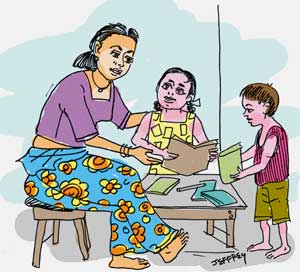Parent Engagement in Children’s Education

The literal meaning of the Sinhalese term ‘degurun’ is: ‘the two teachers‘. It actually refers to the two parents of a child. The Sanskrit-derived ‘poorwachareen’ has the meaning ‘the first teachers‘, and is also a term for ‘parents’. The existence of these terms signifies the importance that our culture traditionally attaches to parents in the education of a child. Parental engagement in education is therefore nothing new to us.
It’s time we appreciated the value of this traditional wisdom. In developed countries, for example Australia and Canada, promoting parental participation in education is government policy. The Australian Capital Territory Department of Education published in September 2001 the educational policy known as the ‘parents/carers as partners in schooling’, which acknowledges “parents/carers as first educators of their children and their right to participate in their children‘s schooling”. Another example from Australia is the Parental and Community Program which specifically aims to ensure parents’ engagement with schools and education providers among the indigenous population. In Ontario, Canada, government funds schemes to involve parents in children‘s education.
We in Sri Lanka are familiar with parents’ protests, sit-ins, fasts, etc demanding redress for various anomalies in school education today. That kind of parental ‘involvement’ is different from what is meant here by ‘engagement’, as will be clear in the course of this essay. It is useful to reflect, however, that parent initiatives such as protests and fasts focusing on problems in education demonstrate an encouraging trend towards a growing awareness among parents about the importance of education, which can eventually lead to their ‘engagement’ in that all important activity (i.e. education).
The idea of engaging themselves in the education of their children is likely to be difficult for many Sri Lankan parents to put into practice in view of other vital demands on their time and resources. Economic pressure is too much for one parent to sustain in most cases. And today, families where both parents work are the norm. In rural villages poverty drives a considerable number of unemployed or underemployed women out of the country to seek gainful employment mostly as housemaids in West Asian countries; a large number of men also work abroad for the same reason.
This is one main cause of there being more single-parent families in the country than ever before; another, of course, is the civil war that ended two years ago. Because of these and other constraints the concept of parental participation in education could sound unrealistic in our context. But we can’t wait until conditions are perfect for a useful proposition to be discussed and practically implemented wherever possible under the prevailing circumstances.
What education involves has undergone profound change in the course of time, though its essence hasn’t: the central aim of education remains essentially the same, which is the training of the individual as a moral and useful member of the society. The educative process today is much more complex than in the past. Teaching has become a highly specialised skill, and learning involves the learner in collaborative social interaction as well as autonomous creative endeavour. But the role of parents as the primary educators of the young hasn’t diminished in any way. Rather, it looks as if parents have got to play a more involved part in the education of their children in the present time than before.
Sixty-five years of free education means that the least educated parent today has passed Grade Five, and is quite conversant with what happens in a school and what learning involves. They are quite competent to play the educative role expected of them. In fact, they need not be very highly educated to be able to guide their school-going children. They have the highest qualification to do that job: love for their offspring. That is the most vital factor that has no substitute.
Parent engagement in education occurs at two levels: home and school. Home is where children start picking up moral values. The common saying “Charity begins at home” usually means, as everyone knows, that we should be kind and generous to our own family before we offer to treat others with kindness and generosity. But the saying can also be interpreted to mean that the foundation for a charitable society is laid at home in the sense that children learn to be loving and caring towards others from their parents and older siblings at home. Parents teach children good moral conduct by setting an example, not through coercive preaching.
We live in a secular democracy. Our society is multiethnic, multilingual, and multicultural. We need to inculcate in our children values that will enable them to live with their neighbours in peace and harmony despite differences. It should be demonstrated that it is not wrong to be different, and that diversity is not something to fear or worry about. Language and religion have been divisive factors in our society to some extent. Mutual respect between people speaking different languages, and following different religions is essential for overcoming these divisions. The Trilingual programme that is being inaugurated is in response to the popular perception that a knowledge of English, Sinhalese, and Tamil will contribute to national integration. Parents can do a great deal to make this plan a success. They must also show that all religions teach moral values, which are compatible with each other, and highlight the principle of tolerance that is advocated in them. It is essential for parents to be aware of the moral values taught in the school. There shouldn’t be any contradiction between those values and what the children are exposed to at home, for value education is best achieved as a joint responsibility of parents and school.
At home, parents can play a direct role in helping children in their school education by finding time to be with them while they do their homework. This shouldn’t be a haphazard activity. First, a regular time every day needs to be set aside for study, say one, one and a half, or two hours, etc with beginning and ending times fixed beforehand as suitable depending on convenience and circumstances. A quiet peaceful environment that helps concentration is an essential condition.
Some parents, exhausted after a hard day’s work, try to get the best of both worlds by lazing before a TV in one corner of the sitting room while having children do their homework in another corner. This is no way to get engaged in educating them.
Children, being children, easily lose interest in what adults consider to be most important. They sometimes feel that schoolwork is best forgotten. Homework is an additional burden that they have to carry. Parents should ease this burden not by doing the homework for the children, but by turning it into an opportunity to show off the skills acquired at school. It is good to get them to talk about what they did at school, and about what they learnt. Although the information that students are required to know may be new and beyond the grasp of their parents, the latter can occasionally demand to have it explained to them. This is a good strategy to get children to tackle problems they encounter in studies by themselves.
Parents should encourage children to learn by themselves. A good way to do this is to show appreciation of their efforts in that direction by rewarding them appropriately. For example, parents can promise to buy them a computer and an internet connection (or if they already have these, some other reward) if they agree to save money for the purpose by cutting down on private tuition. Parents should, within their means, supply supplementary materials like books, magazines, journals, newspapers, etc that are relevant for their studies, and get them to use these at home.
There are a number of ways in which parents could play a role in education at the school level. Meeting with the teachers individually on a regular basis to discuss children‘s progress and problems is one of these. The knowledge that parents are keeping tabs on their children‘s performance at school makes teachers feel more responsible towards their charges, and to have better control over them. Familiarity with a child‘s home background enables a teacher to individualise their approach in classroom teaching. This parent–teacher communication causes children to be extra alert in their studies as well as general conduct.
Educational tours, field trips, charity events etc organized by schools afford parents a good opportunity for voluntary participation. Not all parents can engage in such events all the time. Representative groups of parents should take turns as proper. While providing guidance and protection they need to respect the children‘s autonomy and initiative in organizing and executing the relevant activities where they are old enough to do so. Parents can engage themselves in school education as members of Parent Teacher Associations. They can also serve on school committees, councils, boards etc.
Given the fact that a modern knowledge society is emerging where parents are more techno-savvy than today, we may reasonably expect parent engagement in education to be enhanced in the near future through the use of modern communications technologies in the form of institution based websites, homepages, videos, newsletters, calendars, etc which will enable close communication between parents, educators and students. These electronic tools will help parents to access, whenever necessary, information about the attendance, performance, grades, etc of their children; it will also keep parents informed of special educational events, celebrations, trips, etc so that they could participate in them.
Parent engagement goes beyond mere involvement in the affairs of a school: it consists in parental participation in a tripartite partnership (i.e. between parents, students, and teachers) focussed on an active process of education. Naturally, parent engagement supports useful communication between children, parents, and teachers; healthy interaction between these three groups is vital for education. Engaged parents prove to be valuable resources for experience, expertise, knowledge, and skills. The collaboration between parents and educators that parent engagement achieves can be used to promote the understanding of diverse cultural values and languages, and social integration in our multiethnic society. Since engaged parents are aware of what usually goes on in a classroom, and how students learn they can make a valuable contribution to the success of school activities. They also support students at home. It’s no wonder that parent engagement leads to significant improvement in student attendance and performance, and hence the general standard of education in the country.



